The traditional site of Jesus College, which was established in 1496, saw a much younger anniversary than many it has seen, with the tenth birthday of the Keynes Fund this autumn.
With numerous guests arriving through the leaves fluttering down across Midsummer Common outside Jesus College, all sporting the many papers which the Keynes Fund has financially supported in the atmosphere of Frankopan Hall, where the nineth research day was held.
The Keynes Fund, based in the Faculty of Economics, has provided resources and funding for early stage researchers as well as for established academics at Cambridge for the past decade, to enable them to engage in quality research in economics and finance.
It was established in 2012 through a generous donation, and has a remit to fund research which increases understanding about how key distortions that affect market allocations and create inefficiencies. It then aims to find policy solutions to correct such inefficiencies.
Over the past decade it has seen more than 60 research projects which have received about two million pounds of support. Grants are typically used to pay a research assistant’s wages, or to buy data, and has become ever more important, because applied research is now much more labour intensive than it used to be. In particular, good high quality data is now much more expensive to source than in decades past.
To celebrate the tenth anniversary of the donation which has enabled so much extraordinary research to take place, a cake in the shape of the numbers ten was served half way through the research day.
Dr Toke Aidt, the Keynes Fund Director, gave an initial introduction, welcoming the nine papers that would be presented on what, appropriately enough, is the nineth annual research day, and also the first that has been able to take place in person for several years, due to the recent pandemic.
“It’s been clear that many of the funds we’ve allocated have gone to research projects would, without funding, struggle with freely available data that may be very basic or incomplete. It is essential that we fund high quality research to ensure it meets academic rigour,” he explained. “Much of the research supported by the fund is highly relevant to understanding real-world problems and to finding solutions and essentially to gain a better understanding of economic and social interactions.”
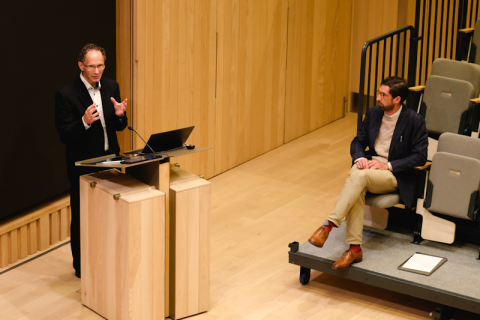
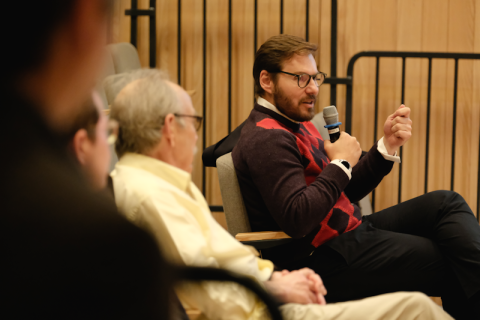
One of the most recent projects supported by the fund is by Chris Rauh, on the rise of automation, and what that means for the workplace. He explained it isn’t a new phenomenon – indeed, it can be dated to before the creation of the first cotton mills in Northern England – however, each time new technology is developed, there are the same impacts, with as he says: “the young fearing it more, while older workers seem to be more sanguine, and realise it is just part of the constant process of change in which we live.”
Christopher Rauh -- The Impact of Fear of Automation
Johannes Lennard followed this with an analysis of tech bubbles, and how they are funded. Recent bubbles, such as the dot com boom and then bust were described, and among many asking questions was Dr Aidt, who asked how the current macro-economic turmoil would impact on Venture Capital, which was an appropriate point for Bill Janeway to give his insights; he is an American venture capitalist and economist. His work on the innovation economy emphasises the strategic role played by the state and by financial speculators.
Johannes Lennard and Alexander Shadbolt -- ‘Bubbling away - tech bubbles, due diligence and ESG in venture capital. A qualitative exploration’
Dr Aidt then lead the discussion opener for a fascinating explanation of the way in which the building of lighthouses around the UK dramatically reduced the number of shipwrecks, and hence facilitated trade and an economic boom. The Keynes Fund has enabled the creation of a dataset which plots both lighthouses and wrecks, and a correlation between the two.
Alexis Litvine, Dan Bogart, Oliver Dunn and Leigh Shaw-Taylor -- Let there be light. Lighthouses and safety on British seas, 1747-1911
Weilong Zhang then presented research much closer to home for many: analysis of how households bargain, looking at traditional gender norms in Australia, Germany and the United States.
Weilong Zhang -- The Gender Gap in Household Bargaining Power: A Portfolio-Choice Approach
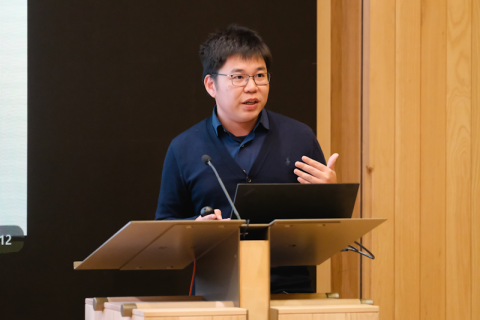
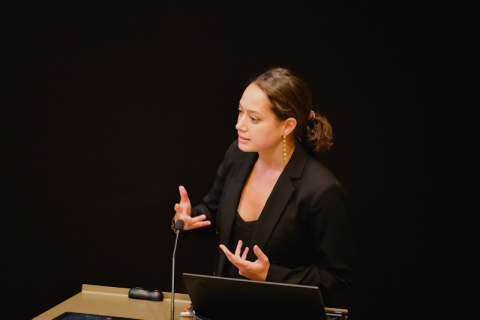
Caroline Lung both opened the discussion of this, and then followed on with her own paper on Identity-Driven Choice Behaviour.
Caroline Liqui-Lung -- On the Origin and Persistence of Identity-Driven Choice Behaviour
Daniel Ostry was one of a number of researchers who joined the research day remotely, as this was a hybrid event ensuring the maximum number of people could attend. The work was directly relevant given the volatility on the financial markets this autumn, and he explained that exchange rates are a very good measure relative risk.
Giancarlo Corsetti, Simon Lloyd, and Daniel Ostry -- The U.S. as a Safe Haven: Evidence from Convenience Yields, Exchange Rates and Country Risk in the Short and Long Run
Pedro Saffi started his presentation with a quote from John Lennon, explaining that although the world seems highly unstable at the moment, “it will all be OK in the end”. The dataset he worked with, which originated in Brazil, is one of the few that can give real insights into demand and investments.
Alan de Genaro, Pedro Saffi, Andre Silva, and Argyris Tsiaras -- The Price Impact of Investor Flows: Understanding Heterogeneity in Equity Demand Elasticities
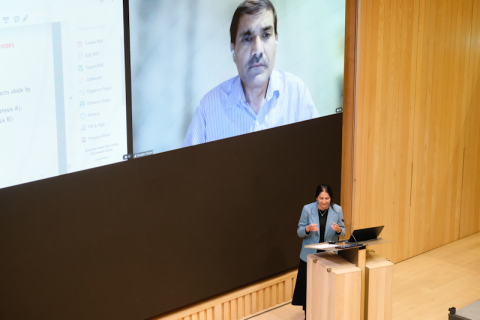

Asking how teams shape themselves to match workers abilities and the teams in which they operate, Lukas Freund, explained that in a modern economy where everyone has multiple skills, and deals with complex tasks, teams of a similar quality often share similar values.
Lukas Freund -- Superstar Teams: Implications of the Knowledge Economy for the Distribution of Wages
Finally, Sanjeev Goyal looked at how people network, and how it fits with a changing business model.
Sanjeev Goyal -- The Economics of Networks: Lessons from Large Scale Experiments
More details of the work of the Keynes Fund, and the research it has funded, are given in the video which was presented at the end of the research day.






